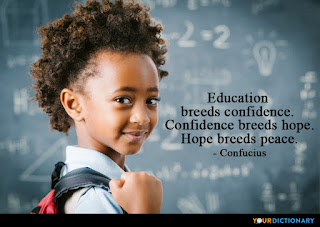MEANING AND SCOPE OF ECONOMICS OF EDUCATION:
The word 'Economics' is partly derived from the Greek term Olkynonmia, which means household management. It includes management with respect to wealth- centered, scarcity-centered and wantlessness- centered. Economics is a welfare science.
Education seeks the help of economics to achieve national development in all fields of national life and all spheres of national development including economic prosperity and national security. There is a relation between education and economy, the economy of a particular country influences its education, while economy of education affects the planning of education of that society. Thus education and economy are two sides of a coin.
We humans are the smartest creation of man out of all the creations by the ultimate power. Humans are bestowed with much developed intellectuals which the other creatures lack in them. I would like to quote here a saying by Swami Vivekananda, "Education is the manifestation of the perfection already existing in man". Education is a holistic development.
Education as a whole develops the personality to the full but also promotes the social attitudes thereby the working efficiency as dynamic and useful citizens contribute this best to social and economic welfare of the country. This has led to the concept of free and compulsory education. This is where economics of education is studied.
The expenditure on the education that is provided and the returns we get because of the educated masses for a nation is for its own good.
The scope includes:
1. It studies education as a human capital.
2. Determining the relationship between the expenditure and the return (form of income) over a period of time.
3. Assessing and determining the contribution of education to GNP (Gross National Product) of a country.
4. Estimating rate of returns from the educational investment.
5. Manpower planning and formulating educational planning.
6. Estimating wastage and steps to overcome it.
7. Synchronizing the educational- social system.
8. Identifying the priorities in the National Policy on education and its implementation.
9. Redistribution of resources and priorities.
10. Promoting changes in education to make it more socially relevant and economically productive.
11. Improving the techniques of educational planning and management.
EDUCATION AS A HUMAN CAPITAL:
EDUCATION AS A HUMAN CAPITAL:
Education is regarded as a Human Capital, as it directly promotes the quality and capability of human beings. Education contributes to intellectual capital as well as to some extend to social capital.
Education is regarded as Human Capital because:
1. Development and formation of human capital involves cost.
2. The cost of skilled human resources are incrementally to the natural product.
3. Expenditure on human resources not only increases the national product but also the national wealth.
4. Factors that have an effect on human capital formation are investment in:
a) Formal education.
b) Improved health.
c) On the job training.
d) Man power rehabilitation.
5. Formal education enhances the economic value of human capital by raising the potential earning power and current asset value of human being.
6. Human capital ie, acquisition of skills and useful knowledge can be developed through education, job training, public health, medical facilities, nutrition, housing and social services.
7. Improvement of human capital results in qualitative growth of man power.
8. There is no consensus on this issue among economists, while Theod Schutlz considered quality manpower alone as human capital. John Stuart Mill questioned the very concept and averred that wealth existed for people and people cannot be treated as wealth.
ROLE OF EDUCATION IN HUMAN RESOURCE DEVELOPMENT:
Human being, who is a precious resource himself, facilitates the harnessing of the other natural resources. Human being, who is like an uncut diamond, has the potential to become a gem. Education and proper training facilities will enhance this process. Human resource development according to Harbison and Myers, is the process of increasing the knowledge, the skills and capabilities of all the people in a society. Human being as suggested as a uncut diamond can become a valuable resource only if he or she is trained, developed and allocated to productive work. Human resource development which is complex process, can be studied under the following categories:
A. Health.
B. Education.
C. Youth welfare.
D. Social services.
The role of education in human resource development are listed as:
1. Universalization of Elementary education.
2. Equalization of Educational opportunities.
3. Special focus on Educationally backward communities.
4. Encourage girls and women education.
5. To eradicate gender gaps.
6. To extend adult and non-formal programmes.
7. Implementing the vocationalization of education.
8. To strengthen the technical education.
9. To encourage the public awareness programmes.
10. More allocation of budget in education.
11. To develop value based education.
12. To develop National integration and International understanding.











I’ve been using Online Tuition in Oman for my child through Ziyyara, and the experience has been outstanding! The tutors are highly professional and make learning engaging and effective. I also worked with an SEO expert who helped me understand how online visibility can make such a big difference for educational platforms. I’d highly recommend their services to anyone looking for quality online education and smart digital growth strategies in Oman.
ReplyDelete